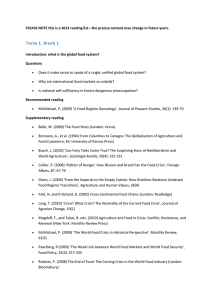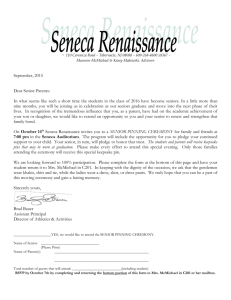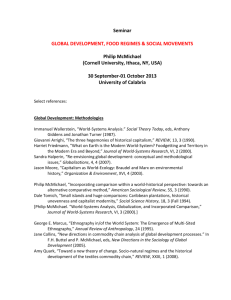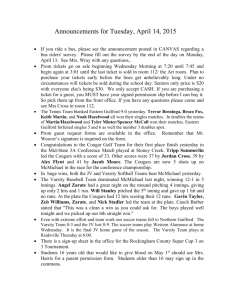preserving slave records through ecclesiastical archives
advertisement
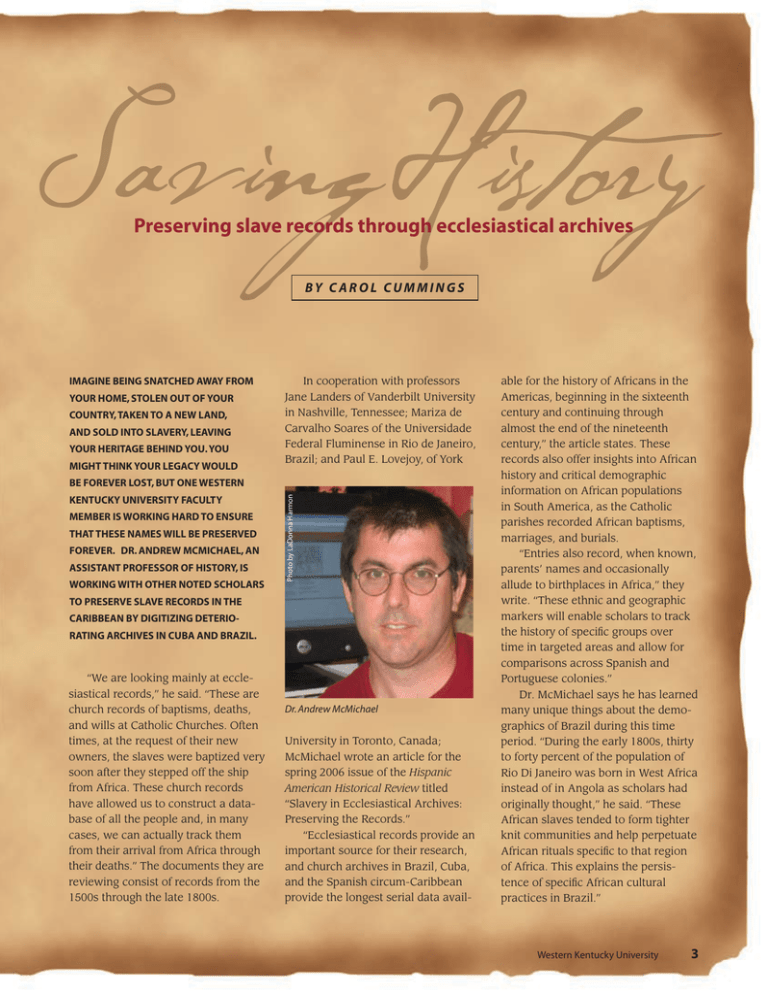
Preserving slave records through ecclesiastical archives B Y C ar o l C u mm i n gs Imagine being snatched away from your home, stolen out of your country, taken to a new land, and sold into slavery, leaving your heritage behind you. You might think your legacy would In cooperation with professors Jane Landers of Vanderbilt University in Nashville, Tennessee; Mariza de Carvalho Soares of the Universidade Federal Fluminense in Rio de Janeiro, Brazil; and Paul E. Lovejoy, of York Kentucky University faculty member is working hard to ensure that these names will be preserved forever. Dr. Andrew McMichael, an assistant professor of history, is working with other noted scholars Photo by LaDonna Harmon be forever lost, but one Western to preserve slave records in the Caribbean by digitizing deteriorating archives in Cuba and Brazil. “We are looking mainly at ecclesiastical records,” he said. “These are church records of baptisms, deaths, and wills at Catholic Churches. Often times, at the request of their new owners, the slaves were baptized very soon after they stepped off the ship from Africa. These church records have allowed us to construct a database of all the people and, in many cases, we can actually track them from their arrival from Africa through their deaths.” The documents they are reviewing consist of records from the 1500s through the late 1800s. Dr. Andrew McMichael University in Toronto, Canada; McMichael wrote an article for the spring 2006 issue of the Hispanic American Historical Review titled “Slavery in Ecclesiastical Archives: Preserving the Records.” “Ecclesiastical records provide an important source for their research, and church archives in Brazil, Cuba, and the Spanish circum-Caribbean provide the longest serial data avail- able for the history of Africans in the Americas, beginning in the sixteenth century and continuing through almost the end of the nineteenth century,” the article states. These records also offer insights into African history and critical demographic information on African populations in South America, as the Catholic parishes recorded African baptisms, marriages, and burials. “Entries also record, when known, parents’ names and occasionally allude to birthplaces in Africa,” they write. “These ethnic and geographic markers will enable scholars to track the history of specific groups over time in targeted areas and allow for comparisons across Spanish and Portuguese colonies.” Dr. McMichael says he has learned many unique things about the demographics of Brazil during this time period. “During the early 1800s, thirty to forty percent of the population of Rio Di Janeiro was born in West Africa instead of in Angola as scholars had originally thought,” he said. “These African slaves tended to form tighter knit communities and help perpetuate African rituals specific to that region of Africa. This explains the persistence of specific African cultural practices in Brazil.” Western Kentucky University One of the most exciting finds was in the life of Francisco Menendéz, a runaway slave in Florida. “He was baptized there, ends up in Havana, marries, is recaptured, escapes once again, and becomes a ship captain,” he said with excitement. “Menendéz ends up in the Philippines, where he was a captain of a Spanish ship and later made his way back to the Caribbean.” Much information can be found in these historical records, but many of these documents are in danger of being lost forever. “Churches store most of The Western Scholar | Spring 2006 these records in religious archives or local churches, at risk from climate, bug infestation, and other damage,” he writes. “Too often, local lay persons or parish priests guard the records, and some of these well-meaning individuals are unaware of the historic significance or the fragility of the documents they manage.” In May of 2004 Dr. McMichael traveled with Landers and graduate student David Wheat to begin digitizing records at the churches in Havana and Matanzas using techniques he calls Photo courtesy of Andrew McMichael “guerrilla preservation.” On occasion the team worked without water or electricity, or without sufficient electrical outlets or work areas in which to film. “While some of the volumes at some churches remain in excellent condition, other record books have almost disintegrated, the paper consumed by worms and humidity,” he writes. These collections are being combined into comprehensive databases using so-called “new media,” which will allow for a greatly expanded understanding of African slavery in the Americas. In February of 2005 Dr. McMichael made a second trip with Landers; Wheat; Vanderbilt’s Latin American bibliographer, Paula Covington; graduate students Oscar Grandío Moráguez and Henry Lovejoy of York University; and the archivist from Nova Iguaçu, Antonio Meneses. The group worked together to preserve more than 40,000 images from churches in Havana, Regla, and Matanzas. To expand his work, McMichael has begun to assemble a much larger database of slave records from Matanzas, East and West Florida, and Louisiana. This database will contain an actual digital image of the ecclesiastical record, transcriptions in Spanish and English, and fields for age, name, place of origin, and other relevant information from the record. The total work of the team will not only provide a framework for preserving and disseminating religious documents regarding the history of the Atlantic slave trade and slavery in the Americas, it will also publicize the importance of ecclesiastical archives. “The preservation and dissemination of ecclesiastical records from these areas will help scholars refine demographical estimates of the Atlantic slave trade and answer questions about the ethnicity of Africans in the Americas with more precision…. Scholars can also employ the eccle- Much information can be found in these historical records, but many of these documents are in danger of being lost forever. siastical records in longitudinal and comparative studies of population, fertility, and mortality,” Dr. McMichael writes. WKU also benefits from Dr. McMichael’s work, as he is able to bring these materials to students so they can see them firsthand and work on them. In many cases, the students are working with documents that no other scholars have seen. “My teaching follows my research interests, to a large degree,” he explained. “At the same time, I want my personal interests to influence my teaching as well, which I believe helps keep my classes fresh for students. I believe that students should be challenged to think about history in new ways, that they should think about how history is packaged in the public space, and the ways that knowledge of history can help them better understand their own time. If my classes don’t challenge students’ identity, their assumptions about the world in which they live, and their social and cultural viewpoints, then I’m not doing my job.” Dr. McMichael received both his bachelor’s and master’s degrees from George Mason University and his Ph.D. from Vanderbilt University. Prior to coming to WKU he served as assistant editor for papers of Thomas Jefferson at Princeton University. At WKU he has taught a variety of courses including new courses on Jefferson’s America and the Cultural History of Alcohol in America. Western Kentucky University
